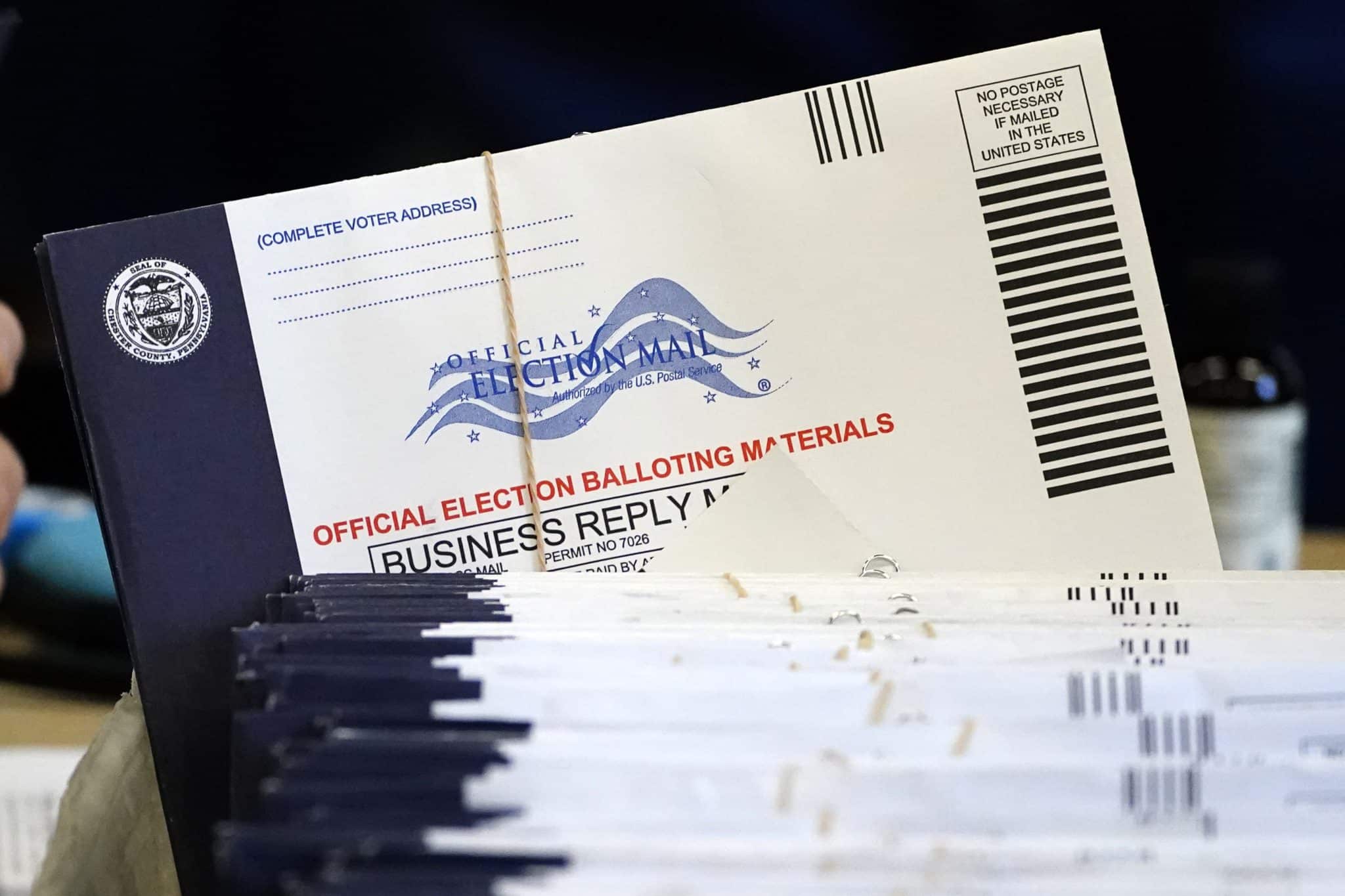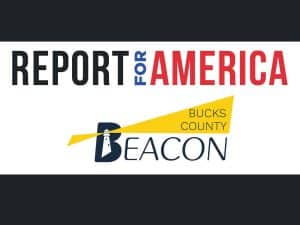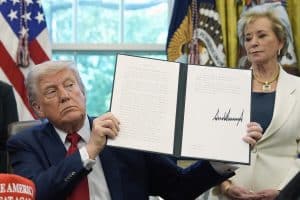With the 2024 election less than two months away, conspiracy theorists in PA, including many in the state government, still insist the 2020 election was filled with fraud and that the 2024 election will be more of the same. To combat these lies and falsehoods, J.J. Abbott, executive director of Commonwealth Communications, ran a panel with current and former election officials, advocates, and legal experts to discuss how elections in Pennsylvania will be run, and what problems those counting the ballots might face in the upcoming cycle.
The panel is the first in a series of scheduled events about the 2024 election in Pennsylvania organized by PA Voters Decide, a nonpartisan, informal coalition. The group was formed in 2022 to “protect our elections and defend our democracy.”
“Election officials face a lot of challenges,” said Abbott. “Part of this is also having the information for people to know so we can have the proper amount of empathy and have the right expectations for the challenging job that our election officials have.”
Abbott then pointed out that the 2020 election was the first time PA had no excuse mail-in voting, and due to the COVID-19 pandemic, there was a massive influx of mail-in votes. This led to the counting of the ballots taking longer than normal.
“Since 2020 and in the years since, our election officials in Pennsylvania have done an absolutely amazing job. Across the board, for the vast majority of our election officials, they have done everything they can to try to improve these processes and not only make the counting of ballots faster but also make it more effective, more secure,” said Abbott.
One major issue that election officials face in PA is that they are not allowed to pre-canvas. This is the process of preparing mail-in and absentee ballots to be counted. Only Alabama, Mississippi, South Dakota, and Pennsylvania have to wait until Election Day to start pre-canvassing, which makes it take longer to count the mail-in votes.
“I meet with election officials from all over the country in preparation for this election,” said Seth Bluestein, the sole Republican City Commissioner in Philadelphia County. “And they are amazed at the fact that we still don’t have pre-canvassing in Pennsylvania with the amount of attention that will be on the commonwealth for this election.”
While Bluestein feels very very confident that Philadelphia has the resources to handle mail-in ballots, he worries that other counties will not have the manpower to have the ballots counted quickly. “In some of our counties, there may be one part-time official trying to manage the elections for that county. It’s not an easy job. So, with that background, just trying to set some expectations for what you’ll see coming up for this November election.”
READ: Pennsylvania Supreme Court Restores Date Requirement for Mail Ballots, Voiding Lower-Court Ruling
In May, PA Democratic lawmakers passed a bill to allow pre-canvassing seven days before the election. It passed 102-99, with no State House Republicans voting in favor. The bill is currently stalled in the Republican-controlled Senate, where no vote is expected before Election Day.
The other reason that counting the ballots takes time is because ballots need to be transported before being processed.
“For example, Luzerne County has 186 precincts that are spread across a very geographically large area,” said Beth Gilbert, a former Deputy Elections Director in Luzerne County. “So, the process of bringing results from polling locations at the southernmost part of our county, which is 40 minutes away from where the bureau is, takes time. It takes time to open the judge’s bags and process all of that. So, sometimes the mail-in ballots will almost be totally processed on Election Day, aside from the ones that come in right before 8 p.m. But, then you still have to wait a couple of hours until you get results from the polling location.”
“I think regardless of how long this might take to get results on election night, it’s important to remember that just because it takes time, it’s not a bad thing. It means that election officials are doing this with integrity and that it’s being managed properly,” Gilbert said.
Amy Widestrom, the Executive Director for the Pennsylvania League of Women Voters, debunked some of the other myths about the length of time it takes to count the votes. “There have always been post-poll closing delays because of what everybody’s talked about. It takes time to get materials from each precinct, with 9,000 precincts in the county. As a judge of elections, when I used to close my polls, it would take time to reconcile votes and get all the materials back to the proper authorities collecting that information, and that just takes time. So part of it’s that,” said Widestrom.
“Part of it is that we don’t have pre-canvassing, and so we can’t start processing those mail-in ballots until Election Day,” Widestrom said. “After Act 77, and … mail-in ballot voting came online, we have seen a huge increase in the number of folks using this. Which is good. It expands access to the ballot. It helps voters who might otherwise have a hard time getting to the polls on a Tuesday in November.”
While Widestrom is much in support of mail-in ballots, the uptick of them being used during elections has been a factor in the counting process being slowed down. “We had roughly 262,000 mail-in ballots that were returned in 2016. And there were 2.6 million returned in 2020,” she said. “Now, some of that was the pandemic certainly, but we still saw a large number of ballots returned in 2022, about 1.1 million. So, it’s just a huge increase in the use of mail-in ballots, which is great because that expands accessibility.”
READ: Pennsylvania’s polling place lookup tool has errors that could frustrate voters
As for conspiracies from the right that illegal voters will swing the election, no one on the panel saw this as a likely scenario. “When I was a deputy commissioner for then city commissioner Al Schmidt, we conducted an investigation in Philadelphia into non-citizens registering to vote and some voting,” said Bluestein. “We saw a pattern of that happening and we worked directly with the Department of State back in 2017 and found out that it was because of an issue at PennDOT. When voters would go to apply for their driver’s license, if they are not a citizen there is an indicator on their license. But they were still being offered the register to vote screen.”
“And that is not the fault of those voters. They are being presented the option to register by a government agency, and that was a problem that needed to be fixed. To Governor Wolf’s credit, to the Department of State’s credit, after we met with them they took is seriously. They fixed the problem. And this was not a partisan issue. That was true under Republican governors and Democratic governors ever since motor voter was established. So, we worked very closely with the Department of State to close that gap, and as far as we can tell it has not been a serious issue since then,” Bluestien said.
The 2024 election will be on Tuesday, Nov. 5. If you requested a mail-in ballot, they will be sent out 30 days before Election Day. If you want to request a mail-in ballot, the deadline to do so is Oct. 29 at 5 p.m.

This article is part of U.S. Democracy Day, a nationwide collaborative on Sept. 15, the International Day of Democracy, in which news organizations cover how democracy works and the threats it faces. To learn more, visit usdemocracyday.org.






